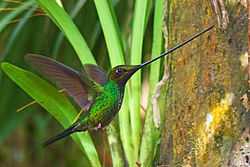Sword-billed Hummingbird
| Sword-billed Hummingbird | |
|---|---|
.jpg) | |
| Sword-billed Hummingbird | |
| Conservation status | |
| Scientific classification | |
| Kingdom: | Animalia |
| Phylum: | Chordata |
| Class: | Aves |
| Order: | Apodiformes |
| Family: | Trochilidae |
| Genus: | Ensifera Lesson, 1843 |
| Species: | E. ensifera |
| Binomial name | |
| Ensifera ensifera (Boissonneau, 1840) | |
Sword-billed Hummingbird (Ensifera ensifera) is a species of hummingbird from South America and the sole member of the genus Ensifera. It is found in the higher elevations (mostly above 2500 meters) in Bolivia, Colombia, Ecuador, Peru and Venezuela.
Etymology
The genus and species name ensifera ("sword-wielder") is derived from Latin ensis (sword) and ferre (to carry), and refers to this hummingbird's remarkable beak length.
Description

It is noted as the only species of bird to have a bill longer than the rest of its body. This adaptation is to feed on flowers with long corollas such as Passiflora mixta. The tongue is therefore also unusually long.
Since the Sword-billed Hummingbird's beak is very long, it grooms itself with its feet.[2] From base of the bill to the tail tip, this species averages 14 cm (5.5 in) in length, not counting the 10 cm (4 in)+ bill. This hummingbird weighs about 10–15 g (0.35–0.53 oz) and is one of the largest species of hummingbirds.[3]
-

From Haeckel
References
- ↑ BirdLife International (2012). "Ensifera ensifera". IUCN Red List of Threatened Species. Version 2013.2. International Union for Conservation of Nature. Retrieved 26 November 2013.
- ↑ Clayton, Dale H; Cotgreave, Peter (1994). "Relationship of bill morphology to grooming behaviour in birds" (PDF). Animal Behaviour 47 (1): 195–201. doi:10.1006/anbe.1994.1022.
- ↑ Burnie D and Wilson DE (Eds.), Animal: The Definitive Visual Guide to the World's Wildlife. DK Adult (2005), ISBN 0789477645
External links
- Video of female using feet for grooming on the Internet Bird Collection website
- Mangoverde world bird guide
- Skeleton of Sword-billed Hummingbird at the Slater Museum of Natural History, University of Puget Sound
